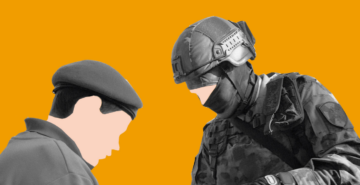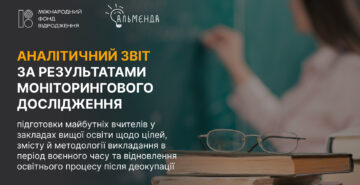

The study “Lessons (not) learned: countries’ experiences in reintegrating children and youth”
“Since wars begin in the minds of men, it is in the minds of men that the defences of peace must be constructed.”
This phrase begins the UNESCO Constitution, which was adopted shortly af ter the end of World War II when a new order of global security and a new system of human rights protection was created. The experience of the totalitarian states of the 20th century, including Nazi Germany, was mentioned during the adoption of key in ternational human rights agreements (the Universal Declaration of Human Rights, the Covenant on Civil and Political Rights and the 1966 Covenant on Economic, Social and Cultural Rights). This includes the use of education to incite inter-ethnic hatred and the use of youth movements to militarise children and young people (e.g. the militarist organisation Hitler Youth, which was supposed to educate German youth in the spirit of national socialism). International agreements and the newly created human rights protection system were supposed to prevent such practices from happening again in the future.
The current Russian-Ukrainian war and its consequences for children and youth show that existing instruments are ineffective in preventing these practices. Since 2014, the Russian Federation has deliberately and systematically violated the laws and customs of war by introducing its own educational standards in the temporarily occupied territories (hereinafter referred to as TOT), while simultaneously obstructing access to Ukrainian education. Such practices are also a violation of the Convention on the Rights of the Child and the Convention on Economic, Social and Cultural Rights, which enshrine the right of the child to an education consistent with his or her cultural identity.
Education in the Russian-occupied territories is used as a means of destroying Ukrainian identity and replacing it with Russian identity. In this way, the Ukrainian language and Ukrainian studies subjects (literature, history, etc.) are removed from public circulation, and “traditional Russian values” are systematically imposed, including “service to the Fatherland” and the willingness to sacrifice for Russia. For this purpose, historical narratives are distorted, patriotic youth movements are created (which are the successors of the traditions of the Soviet pioneering and the Hitler Youth), and the population is actively prepared for an existential war against external enemies – including Ukraine and the so-called “unfriendly countries”, namely the EU and NATO.
Since the beginning of the full-scale invasion in February 2022, the geography of the territories occupied by Russia has expanded, and
as of February 2024, Russia controls approximately 26% of Ukrainian territory
The conditions of Russian occupation, in which access to alternative resources is limited and schools and educational institutions are the main agents of spreading Russian narratives through curricula, provide an ideal basis for the destruction of Ukrainian identity, especially for children, whose psyche is particularly vulnerable to external influences.
The liberation of all Russian-occupied territories and the restoration of interna tionally recognised state borders are a prerequisite for peace. However, the physical liberation of the territories from Russian occupation is only one component of restor ing peace in Ukraine – and only the first step on this path.
Nearly 1,6 million Ukrainian children are now under Russian influence, which is quite effective for children’s underdeveloped psyches. A generation is now growing up in the occupied territories that has been exposed to systematic Russian propaganda from an early age.
The mental or cognitive de-occupation of Ukrainian territories has already been identified as one of the main directions of state policy on the de-occupation of Crimea. However, this direction is relevant for all occupied territories.
Cognitive de-occupation is a set of strategic, operational and tactical measures to be planned and implemented by various actors to prepare, direct and assess long-term socio-political, socio-economic and socio-psychological processes of re-shaping the actual consciousness, social values, worldview and civic behaviour of many Crimean residents after the kinetic and/or diplomatic de-occupation of the peninsula, and, as a result, the full restoration of Ukrainian legislation and sovereignty over the territory
In this study, we want to contribute to the issue of cognitive de-occupation by analysing the successful and unsuccessful practices of states that have experience of wars and overcoming the consequences of separation – physical, linguistic and/ or mental. This experience will help to understand how Ukraine should formulate its own policy of reintegration of children and youth from the occupied territories to make this process as atraumatic as possible for children and youth, while contributing to peacebuilding and reducing the level of polarisation in society.
The structure of the Research
The study is divided into country-specific chapters (countries of the former Yugoslavia, Germany, Northern Ireland, and Belgium) and is summarised in a matrix of successful and unsuccessful practices in the context of the following challenges: overcoming trauma, changing worldview, memorialisation, social and economic perspectives, segregation and discrimination. Aspects of changing information and cul tural environments, as well as changing identities, although relevant in the context of Ukraine, are not addressed in this study due to a lack of applicable information.
The publication of this study was made possible with the financial support of the UK Government as part of the project “The Way Forward: Laying the Foundations for a Shared Future”, implemented by the CCE “Almenda”. The views expressed in this publication are those of the authors and do not necessarily reflect the official position of the UK Government.



